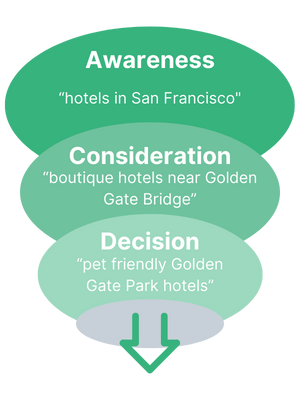Let’s Talk Search Intent and Keyword Strategy

At Vizergy, one of the first things we do when we begin an SEO campaign is map out a keyword strategy. Since the searches you want your site to show up for start with a phrase, we need to invest time and thought into this foundational element of SEO. While many people would assume just looking up the most heavily searched phrases and integrating them into your website copy is how keyword research works, it’s actually one of the worst things you can do, and we’re about to tell you why.
 The Travel Search Funnel
The Travel Search Funnel
When you think about how people search for travel, it’s important to remember that travel rarely gets booked in the first search – the conversion funnel for travel generally involves several searches, with the keyword phrases changing along the way. But it starts with broad location searches in general – i.e., “hotels in San Francisco.” This is a top-of-funnel search during the research phase of travel booking and rarely ends in a conversion at this point. While it is of course ideal to have visibility and ranking for such a highly searched term (246,000 searches per month on average), it is incredibly competitive (over 500 million results for this one phrase) and difficult to get and maintain significant ranking for. A great way to determine the likelihood of ranking well for a phrase is to look at what is ranking for it on page 1.
For broad location terms, you will see that OTAs dominate page 1 organic search results. While the map results are based mostly on the property’s exact location, and the ads are pay to play, the organic results and People Also Ask sections are filled with OTA and travel sites. You will only see actual hotel websites on page 1 if your results are skewed by your own search history, or the market is small and has little competition.
But think about why Google would choose OTAs as the most relevant result for these types of searches – the intent behind a broad search for a location tells Google the searcher is in the research phase of the booking funnel and wants to see options. OTAs are miniature search engines for hotels, so providing these results is an excellent experience for a searcher. This is how they start narrowing down their travel needs and finding the neighborhoods and amenities that speak to them.
While it’s logical to think you would want your website to rank for larger location terms, it’s unlikely to rank in a significant spot for it organically, and that isn’t a converting term. This isn’t to say it should be ignored! You can and should include them in your overall strategy to track performance, but by no means hang your hat on them as a driver of SEO performance.
So, what are the terms you want to rank for?
Putting yourself in the shoes of a searcher is a vital skill when doing keyword research and developing your strategy. When you think about how people find the right hotel, you must think about specifics and what is relevant to your property. The keywords you can gain visibility for and convert into bookings are the ones speaking to attributes, local demand generators, and experiences. Terms that hit these marks should be the bulk of your keyword strategy and where you invest most effort into ranking for.
Say the person searching for a hotel in San Francisco does the research – she finds the neighborhood she wants to stay in and checks out available options. Now her search has changed, and she wants to stay in a small hotel near Golden Gate Park, with a view of the bridge, and she has her dog Fido with her too. If you have a pet-friendly hotel within walking distance from Golden Gate Park and views that should be on Instagram, you better hope these keyword phrases are represented in your website copy so that you not only can rank for them but will also convince the searcher you are the best hotel to suit her needs and get that direct booking. Some keywords that should be in the strategy for a hotel like this are “boutique hotels near golden gate park,” “hotels with view of golden gate bridge,” and “pet-friendly golden gate park hotels.”
These terms are much less competitive, extremely relevant to your property, and more likely to lead to a booking. But you will naturally have a lower search volume of a few hundred or thousands a month, as opposed to the massive search volume of the generic “hotels in San Francisco.” Search volume being lower isn’t a negative – you are targeting people who are looking for something specific, so naturally fewer people will be searching for it. But these are the terms that are lower funnel and have a booking intent.
When it comes to deciding what kinds of keywords you want to target and track, going solely for the high search volume location terms is a missed opportunity to rank well for relevant terms that will move the needle regarding natural search visits and revenue. Optimizing for the middle and bottom funnel terms will never be a waste of time or effort and should be a large part of your keyword strategy.







